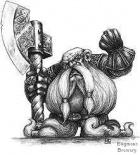Just released is a thought provoking investing podcast with Patrick O’Shaughnessy and Liegh Drogan. The interview debates the future of stock-picking vs. passive factor investing. The apt by-line is perhaps, “this is what you are up against” and it covers among others the failure of US Value investing over the last 7 years and the rise of new and as yet unknown algorithms in factor investing.
The take home message for me is to stick with small caps that are under researched by both fund managers and the mightily machines! Also that a combination of "rational" human and machine minds may still outperform each individually. To potential Quants - Enjoy. Ian
Podcast: http://investorfieldguide.com/drogen
Fascinating podcast and well worth the time. It does raise some interesting thoughts.
Efficiency itself is a strange thing. If a market is completely efficient then there is no way to beat the market, so you might as well invest completely passively by buying the whole market. But if everyone invests passively the market will not be efficient and you can get an edge by making active choices.
I suppose factor investing is the natural consequence of a realisation that there has to be some discrimination even in a so-called passive strategy. Once you model stock prices using factors (essentially multiple "betas") then "alpha" is just the random variance which is left over - and which you might or might not be able to exploit if you can understand it better than the next guy. But as systems get more and more sophisticated this kind of alpha is rapidly disappearing - or at least only available to those with enormous resources available to find it.
All that remains then is essentially to master and understand the "factors" - which might be based on fundamentals or behaviour or whatever. It is a standard statistical technique but what makes it interesting in finance is that the system being studied notices that it is being studied and changes its behaviour. (Thank God electrons don't do that kind of thing!)
However there are aspects that the market can't change. Long term, "quality" will out. If a company is making money then it is making money. Focusing on quality factors and rebalancing to equal weight should perform well - and it is "virtuous" in the sense that if everyone follows the same strategy it should still work (and is consistent with theories of efficiency.)




.png)






